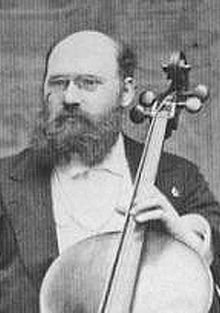Wilhelm Fitzenhagen
Karl Friedrich Wilhelm Fitzenhagen (born September 15, 1848 in Seesen ; † February 14, 1890 in Moscow ) was a German cellist and composer who taught at the Moscow Conservatory for around 20 years .
Life
Fitzenhagen was the son of the town's music director von Seesen and received instrumental lessons at an early age, initially piano at the age of five, cello at the age of eight and violin at the age of eleven. At the age of eleven he made his first public appearance as a cellist. In 1862 he became a student of Theodor August Müller . The Duke of Braunschweig exempted him from military service. In 1867, patrons enabled him to study with Friedrich Grützmacher in Dresden. A year later he became a soloist in the Dresden court orchestra . In 1870 he accepted Nikolai Rubinstein's offer as professor at the newly founded Moscow Conservatory , although Franz Liszt tried to engage him as solo cellist at the grand ducal chapel in Weimar .
In Russia Fitzenhagen gained a reputation as an important teacher, soloist and chamber musician. Joseph Adamowski and Anatoli Brandukov were among his students . He was appointed concertmaster of the Russian Imperial Music Society and in 1884 director of the Moscow Music and Orchestra Society. He was friends with Tchaikovsky and participated in the premieres of several of his chamber music works. a. the piano trio op. 50. In 1876 Tchaikovsky dedicated his Rococo Variations op. 33 to him. Before the premiere in 1877, which he played himself, Fitzenhagen made considerable changes, including the order, and eliminated one variation entirely. In this modified form, which Tchaikovsky sanctioned after initial protest, the Variations were also published in 1889 and are often played up to the present day.
plant
Fitzenhagen left behind more than 60 compositions, including 4 concertos for cello and orchestra and a suite for cello and orchestra, as well as chamber music (including a string quartet, Perpetuum mobile op. 24 for cello and piano) and songs.
literature
- The New Grove, 2nd Edition (Contributed by Lynda McGregor)
- Biographer. Information from Jens Peter Maintz at Oehms Classics (on CD OC 702 with Fitzenhagen's 2nd cello concerto and others)
Web links
| personal data | |
|---|---|
| SURNAME | Fitzenhagen, Wilhelm |
| ALTERNATIVE NAMES | Fitzenhagen, Karl Friedrich Wilhelm |
| BRIEF DESCRIPTION | German cellist and composer, university professor in Moscow |
| DATE OF BIRTH | September 15, 1848 |
| PLACE OF BIRTH | Seesen |
| DATE OF DEATH | February 14, 1890 |
| Place of death | Moscow |
